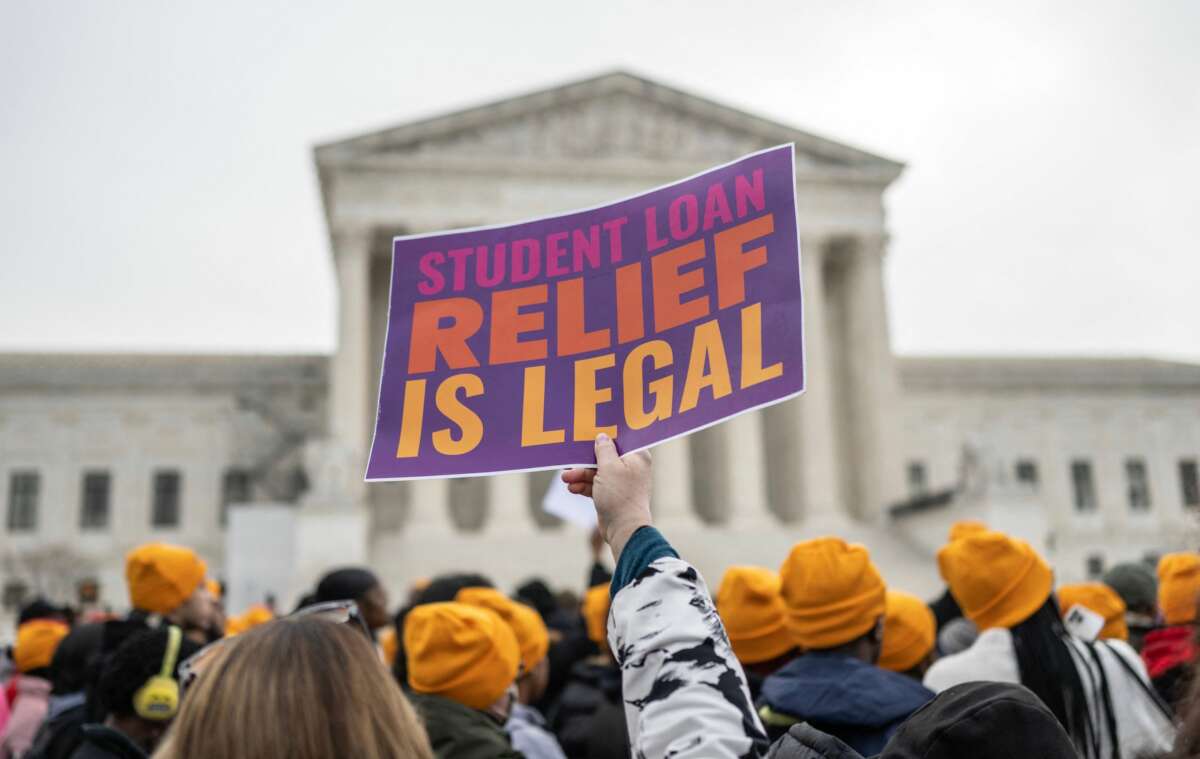An argument at the very center of Republican attorney generals’ Supreme Court case against President Joe Biden’s student debt cancellation analysis is based on a “fundamentally false” assertion, according to a new and apparent first-of-its-kind analysis released this week.
The central theory of standing for Biden v. Nebraska — the case brought by six Republican state attorneys general, including Missouri’s, to strike down Biden’s student debt forgiveness plan — relies on the unproven claim that Missouri’s student loan servicer MOHELA would not be able to pay its share into state treasury (something it hasn’t done for 15 years) if the plan took effect. The argument, which a majority of the Supreme Court appears to favor, boils down to a claim that MOHELA’s finances would be negatively impacted.
But a new bombshell report by the Debt Collective and the Roosevelt Institute finds that MOHELA wouldn’t be financially harmed by student debt relief — and that its revenue would actually soar to record heights as a result of cancellation.
Using internal MOHELA figures from August uncovered by a Freedom of Information Act request by the groups, the analysis finds that MOHELA would make $97 million a year after cancellation, a 9 percent increase over its 2022 revenues. This estimate is conservative, as it is based on MOHELA’s assumption that everyone who is eligible will apply for full cancellation under the plan, which is unlikely.
The revenue boost is attributable to the fact that MOHELA has more than tripled the amount of accounts it services over the past few years as the student loan payment pause has been in place.
Even further, the report estimates that, with a conservative estimate based on the $11.49 per account that MOHELA is paid to process a discharge — which will likely be more under the Biden administration plan — the servicer would experience a windfall totalling tens of millions of dollars as a direct result of cancellation. The report authors conservatively estimate that MOHELA would make $167 million in the first year after cancellation — an 88 percent increase from its 2022 revenue.
If true, the report’s findings eliminate standing — or the basis for one’s ability to argue a case in front of a court — for the Republican officials’ claims against student debt relief. Though much of the debates around the case have centered on whether or not the Biden administration has the authority to cancel student debt, the report essentially lays out evidence that Supreme Court justices should not have taken up the case to begin with; the report authors wrote that their report suggests the case for standing “is even weaker than previously considered, if not completely baseless.”
Even if the findings by the Roosevelt Institute and Debt Collective weren’t entirely accurate — and there are no similar calculations to rebut them — experts say that it is absurd that the Supreme Court would have taken up the case without any proof of standing from the plaintiffs.
“Missouri based much of its argument for standing on the claim that MOHELA would *necessarily* pass along any economic harm from the debt relief program to the state. Even an unrelated windfall substantially reduces the likelihood of that pass-through occurring,” legal expert Steve Vladeck wrote on Twitter on Tuesday in response to the report.
“But what this all really drives home to me is how ridiculous it is that SCOTUS may reach the merits of this major federal program when the factual predicates on which Missouri’s (dubious) standing arguments rest have not been *remotely* developed by any federal court,” Vladeck continued.
The report also uncovers a number of other questionable circumstances surrounding the case. Though perhaps not a direct financial benefit, the report authors note that the discharge of many of the servicers’ newly acquired accounts would be a huge legal boon, as MOHELA has already been found to be mismanaging Public Service Loan Forgiveness accounts that recently came under its care.
Further, as highlighted by The American Prospect, MOHELA is essentially contractually barred from suing the Education Department’s Office of Federal Student Aid over student debt forgiveness — perhaps explaining why the servicer has distanced itself from the case.
Media that fights fascism
Truthout is funded almost entirely by readers — that’s why we can speak truth to power and cut against the mainstream narrative. But independent journalists at Truthout face mounting political repression under Trump.
We rely on your support to survive McCarthyist censorship. Please make a tax-deductible one-time or monthly donation.
